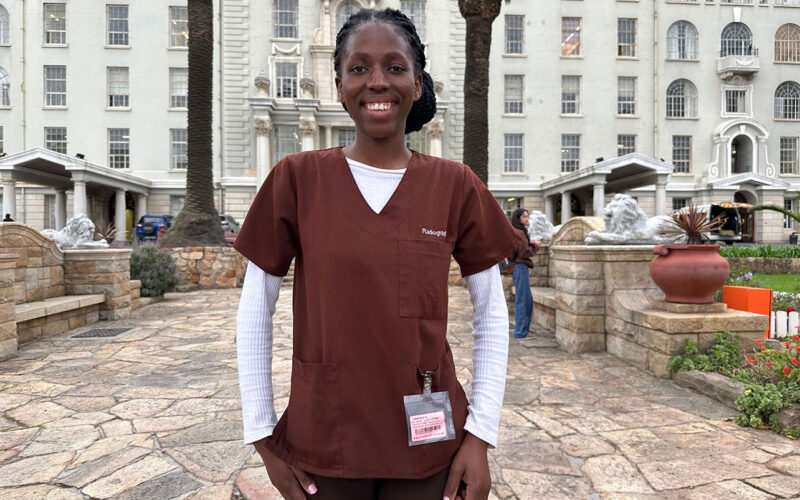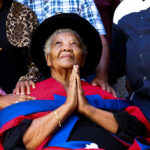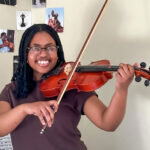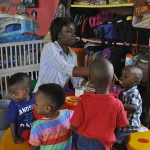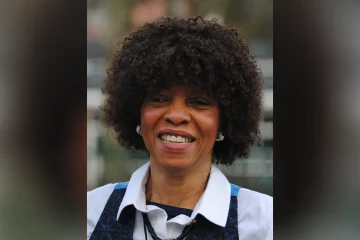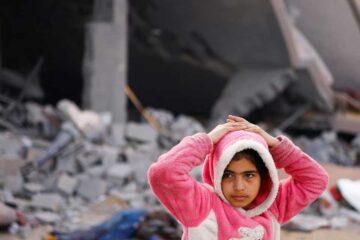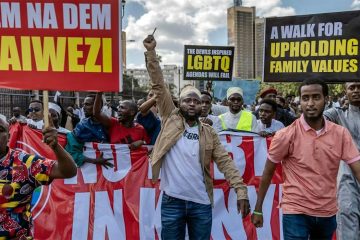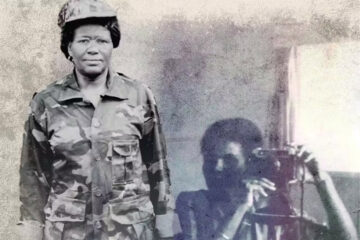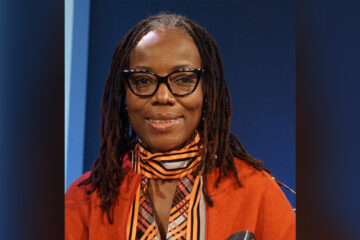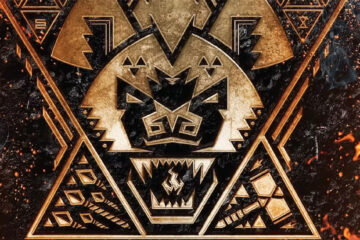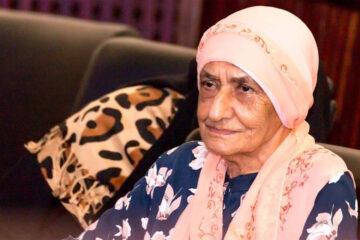WHEN Tholoana was four, her grandmother taught her to write her name using a stick to carve out the letters in the sand outside her home, a one-bedroom brick house in a small, peri-urban area outside of Maseru, Lesotho.
“She didn’t have much of an education, but she taught me letters by the shapes they formed: downward wash basins, chairs, standing tree, and eggs. This is how my name took form,” said Tholoana, recalling those early years, and speaking now at the Cape University of Technology (CPUT) in Cape Town.
“I come from the dusty ground, like a true warrior,” she said, her eyes sparkling at the memory.
Born to a teenage mother and then raised by her grandmother, it was her grandmother’s care and affection that Tholoana felt early in life, and who gave her an appreciation for education.
“We didn’t have much, but I was not aware of what we lacked because my grandmother was there for me. I had a very close relationship with her. She knew very well I loved school and provided for what I needed.”
Tholoana was asked to reflect on DREAMS, the program she participated in as part of a collaboration between USAID and South Africa’s Department of Basic Education, while in high school. The South African program supports girls through critical health information, education and mentorship. DREAMS stands for Determined, Resilient, Empowered, AIDS-free, Mentored, and Safe.
While Tholoana, now a thriving 20-year-old, was happy to provide her insights for developmental purposes, her life story runs far deeper than the statistics could ever indicate. Her journey has taken her from the cosy care of a grandmother, living in the “kingdom in the sky”, Lesotho, to informal housing inside a township near Johannesburg, and back again, before her arrival in Cape Town in 2023.
On the drive to CPUT that morning, the Uber driver had flipped on the radio, 99.5 FM. The voice that entered the car was deep, and male.
“Gender-based violence. South Africa – where the struggle for women never ends,” it said.
Over the driver’s shoulder loomed Table Mountain, its sandstone cliffs clear and bright in the sharp winter air, a sheet of heavy fog pouring through the neck between the mountain and its neighbour, Lion’s Head.
It took millions of years for this incredible sandstone plateau to form. On this day, its deep gullies and towering crags seemed to offer a stark reminder that beauty can be formed from erosion, or from fury, from the stripping away or clashing of something elemental.
The mountain’s refusal to sink beneath gravity’s crushing weight, its defiance evident in its constant presence above the city, is enough to take one’s breath away. On this day in particular, it seemed to stand for so much.
“I have been fighting for a very long time,” Tholoana shared.
The evidence is irrefutable. In this sub-region, one in three women – and in some countries, one in two – continue to experience gender-based violence in their lifetimes, with rates of HIV comparably higher among adolescent girls and young women ages 15 to 24 than their male counterparts.
Add to this increasing number of teenage pregnancies that pull girls out of school and trap them in cycles of poverty, and a picture emerges of a society whose women and girls remain in crisis. And yet, the experience of many girls in this part of the world is that they enter womanhood with the same spirit of defiance characterized by the mountain, a constant reference point in this city.
These young women, these human rocks – the giants, even – survive adolescence in spite of abuse, exploitation and violence from predatory forces that bend their minds, bodies and spirits in terrible directions.
At 10 years of age, Tholoana’s grandmother died. She was sent to live with her mother and father in Soweto. There, she began a totally new life. She was forced to share a one-room shack with an unemployed father who “tortured” her mother under the influence of alcohol and was violent towards his children.
More than once, Tholoana had literal and figurative knives at her throat and was forced to choose between her dreams and her dignity, because those around her deemed that she should not be allowed to have both. And yet, it is clear that in recounting the past, Tholoana is someone who is very much in forward motion.
Eyes the colour of coal, there is fire in her gaze. This is not someone who sees herself as a victim.
“I developed this sense of accepting things the way they are and not letting that define who I am,” she said.
She explained that she is determined to use her experiences to lift others up, to help her show others there are many positive ways forward. Those who know her best speak of a resilience fed from something indefatigable, deep within her.
“She has always learned from her surroundings and other people’s mistakes. She somehow distances herself from the wrong crowd. She is so strong,” explained a cousin.
Along with what she learned from her grandmother, Tholoana credits the DREAMS program for some of her strengths.
“Because we had these programs in our schools,” she explained, “we had information about safe spaces and how to be more assertive and not soft. We found alternatives to help us be productive at school regardless of the problems we had at home. DREAMS gave us information on safe spaces to study, they also taught us financial literacy so we had skills like
entrepreneurship to sell things at school [and] extra money to support our learning,” she said.
Despite the issues at home, Tholoana found a safe haven in school, building a small group of friends, and learning multiple languages to fit in with those around her. Like many girls living in similar conditions, her school became home for Tholoana, a safe space for positive development, both for herself and for the girls around her.
She also excelled at Life Orientation, a subject in school that tackled sexuality education, rights to safe relationships, personal well-being and social development. From her participation in Life Orientation classes and health and sports programming, Tholoana was selected to be a DREAMS Ambassador.
The program teaches adolescent girls about their bodies, addresses social and cultural myths about sexual behaviours, sexual norms and safe practices, and helps them become more street-wise, not just around boys but also around those adults who delight in extinguishing the dreams of girls from under-resourced households.
“DREAMS helped me with understanding [that] beyond the problems we are facing, there are also solutions. I knew where I could go, where to run to.”
As ambassadors for the program, Tholoana said, “We became those girls that were eager to tackle issues, we learned that change should start by us and we could be the ones initiating that change. We became social activists in a way, helping others like us.”
When asked what makes Tholoana so strong, a former teacher put it simply: “Her response is forgiveness.”
Asked whether all that she had learned had helped her build a relationship with her mother, Tholoana paused and looked into the distance.
“It wasn’t easy for her: an adolescent girl jumping stages, becoming a domestic worker so young, meeting a guy, becoming a wife. I am a girl who has choices. But with my mother, she had no choice in anything. She would just take whatever the world was giving her. This played a big role in terms of the parent she became when she was supposed to parent me and my siblings. I cannot repeat the same mistakes. I am aware of what I need to say yes to and what I should not say yes to,” she said.
At university, Tholoana is interested in public health and wants to work with the World Health Organization or humanitarian programs one day. Those dreams motivate her studies. In the meantime, she said, her role as a DREAMS Ambassador is something she will continue to carry with her.
“I share what I have learned and open conversations with others. It’s all about access to information for me and other young women and girls.”
Since arriving at CPUT, the 20-year-old student has researched domestic workers from Lesotho working in South Africa.
She shares critical information in an effort to help mothers encourage their children to stay in school and realize a goal of higher education, whether in Lesotho or South Africa.
She has also looked into the university application process and the financial and administrative support provided by the Lesotho government. She now provides advice to secondary school learners, reviewing academic records and helping them organize their calendars to highlight key dates – then arranges follow-ups with them.
She also encourages and supports mothers wishing to start saving to support fees associated with the application process.
Before starting university, she took a gap year. During that time, just like her mother, she worked as a domestic worker.
“It’s okay to start small. It’s okay to know that you are not the person [others] see at the current moment. I was a domestic worker to earn money to pay for university, to give myself this opportunity. People looked at me and saw a domestic worker. But I was more than that,” she said.
Working to raise money for university, for the dream she had set for herself, made her proud, she said. It also gave her time to reflect on her mother as an adolescent, working in similar conditions.
The difference, in Tholoana’s case, is an education; one that may have resulted from the influence of her grandmother but which she, as a university student, has fully come to own.
“Most of the qualities [Tholoana] has, she takes from her grandma,” her cousin said, smiling widely with pride.
“Like her strength. Giving up is not even in her vocabulary,” she added.
Asked about that strength, Tholoana smiled.
“I have been raised by a large community of people that I look up to. They have given me parental love, all combined. They play parts that could have been played by my mother or my dad. They have supported me emotionally and financially and set an example for me.”
She sat up straight, appearing taller by an inch.
“So often in my life, there’s been a great thing burning. And, I believe if I persist, I will live to tell a story of success from all of this.”
The surname of the character in this story has been withheld for the sake of her privacy.

